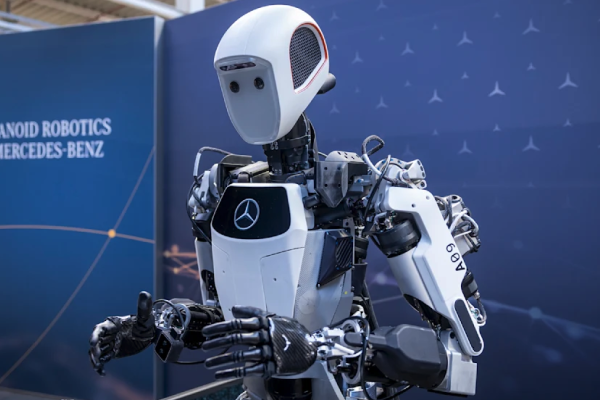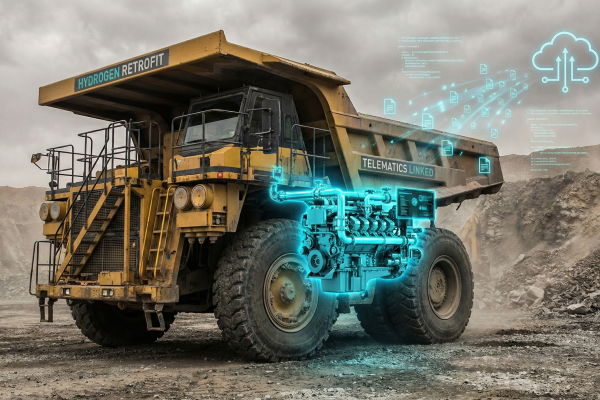July 11th, 2024 | 06:30 CEST
dynaCERT, Volkswagen, Siemens Energy - Growth drivers in renewable energy: Who is leading?
In the hydrogen business, countries are providing government incentives to further promote this innovative technology. For instance, the US Department of Energy is providing around USD 750 million for 52 projects in 24 states. The goal is clear: to make clean hydrogen affordable and to gain international leadership in this sector. The Canadian company dynaCERT has developed an emission-reducing technology to retrofit conventional diesel engines to make them emission-free. This bridging technology combines the best of both worlds: the efficiency of diesel engines and the retrofittable and switchable CO₂-reducing drive form. The engine itself remains untouched in its functionality. One reason for the slow progress of large-scale hydrogen projects is the still lacking infrastructure. Siemens Energy can look forward to significant growth in its Grid Technologies division. Volkswagen, on the other hand, is learning that subsidies are not always advantageous, particularly regarding electric vehicles. The plant in Brussels is on the brink of collapse. And then there is a multi-million-dollar compensation claim from a completely different sector.
time to read: 5 minutes
|
Author:
Juliane Zielonka
ISIN:
DYNACERT INC. | CA26780A1084 , VOLKSWAGEN AG VZO O.N. | DE0007664039 , SIEMENS ENERGY AG NA O.N. | DE000ENER6Y0
Table of contents:

"[...] The VERRA certification adds credibility to dynaCERT's emission reduction technologies by demonstrating compliance with internationally recognized standards for carbon emissions reductions and sustainable development. [...]" Jim Payne, CEO, dynaCERT Inc.
Author
Juliane Zielonka
Born in Bielefeld, she studied German, English and psychology. The emergence of the Internet in the early '90s led her from university to training in graphic design and marketing communications. After years of agency work in corporate branding, she switched to publishing and learned her editorial craft at Hubert Burda Media.
Tag cloud
Shares cloud
Green future for diesel engines? dynaCERT's HydraGEN™ promises efficiency and emission reduction
In Germany, too, the federal government measures aim to introduce hydrogen as an energy source to make the country fit for the future by 2030. A hydrogen core network of over 11,000 km is planned by 2032. It will link the main producers and consumers of hydrogen. But until then, diesel will continue to be used by transport and heavy-duty vehicles to keep the economy going.
Recent scientific studies show that adding hydrogen and oxygen to diesel combustion lowers fuel consumption and increases efficiency while reducing emissions. dynaCERT has developed a patented, scalable technology based on these findings. Their product, HydraGEN™, is a retrofit unit for on-demand H2 and O2 generation for various engine types that reduces fuel consumption and emissions and is compatible with OEM systems.
The HydraGEN™ retrofit kit was designed after intensive development work and extensive field tests as a ready-to-use solution for companies. The patented electrolysis system produces pure hydrogen and oxygen, which are supplied to the engine via the air intake and enable more efficient combustion. This offers several advantages: Fuel costs are reduced by increasing efficiency and economy, emissions, especially CO₂, are reduced, torque and, therefore, engine performance is increased, and the optimized combustion extends the lifespan of the engine oil.
According to the Europan Clean Hydrogen Alliance, high energy costs in Europe are currently delaying the development of large-scale hydrogen projects. The lack of an infrastructure network, the current economic situation, rising interest rates, and inflation are also making investments less attractive and leading to projects being scaled back. For dynaCERT, this market environment could offer a potential opportunity to step in as a bridging technology to make existing transportation companies more emissions-friendly.
Investors can learn more about how it works in dynaCERT's webinar from July 2024.
Siemens Energy plans massive expansion in network business
Siemens Energy is ramping up capacity in its Grid Technologies division. The Company plans to hire over 10,000 new employees over the next six years, increasing its workforce by two-thirds. Investments of EUR 1.2 billion are planned for the expansion of factories and production capacities in the US, Europe, and Asia.
Tim Holt, Head of the division, justifies the expansion with the expected boom in the electricity market. The expansion of renewable energies and the need to replace outdated infrastructure are driving demand for grid equipment. The division is already recording a significant increase in incoming orders. Around 40% of the new jobs will be created in Europe, 20% each in the US and India, and the rest in other parts of Asia and Latin America. In the US, the Company plans to expand its factory in Charlotte, North Carolina.
The expansion of the grid business stands in stark contrast to the problems in the Gamesa wind turbine division, which have burdened Siemens Energy over the last 18 months. Following quality problems and financial difficulties, Gamesa posted an annual loss of EUR 4.6 billion and needs a government-backed rescue plan. It is good that the Company is broadly diversified with various business units.
Volkswagen under pressure: Global decline in sales and Russian million-dollar lawsuit
The German automaker Volkswagen reports a decline in vehicle deliveries in the second quarter of 2024. From April to June, 2,243,700 vehicles across all Group brands were delivered worldwide, corresponding to a decline of 3.8% compared to the same period last year. The Audi brand and the Chinese market, in particular, contributed to this decline. Audi sales slumped by 11.3%, while the core Volkswagen brand lost 5.2%. In contrast, Skoda and Seat/Cupra recorded growth.
In China, business is particularly weak, with a 19.3% drop in deliveries. Anyone who thinks this might have something to do with the EU's punitive tariffs on imports of Chinese electric vehicles would be mistaken. By contrast, sales in Western Europe (+5.1%) and North America (+10.8%) developed positively for the Wolfsburg-based company. However, these markets will not be able to compensate for the losses in China.
Despite the decline, board member Hildegard Wortmann remains optimistic for the rest of the year and expects a slight increase in global deliveries for 2024 as a whole due to the launch of numerous important models in the second half of the year.
However, the bad news is piling up for the vehicle manufacturer. In addition to a plant closure in Brussels due to a lack of demand for e-vehicles, there is now a massive lawsuit for damages - from Russia of all places. A Russian court has ordered Volkswagen to pay damages of around EUR 177 million to its former partner, Gaz. The ruling follows a lawsuit filed by Gaz, which is based on VW's withdrawal from Russia and the termination of the cooperation. VW, which describes the judgment as not yet legally binding, is considering further legal steps. The cooperation involved the assembly of several VW and Skoda models at the Gaz factory in Nizhny Novgorod. So far, the sanctions against Russia have tended to harm German companies.
With its HydraGEN™ technology, dynaCERT is positioning itself as an innovative provider of a bridging solution between diesel and hydrogen technology. The Company supports logistics, shipping, and heavy transport companies with its retrofit kit for diesel engines to make them more efficient and environmentally friendly. Siemens Energy's massive expansion in the network business shows a clear focus on the future of energy infrastructure. The planned investments and new hires point to strong growth for Siemens Energy in this area. The breakdown by countries such as Europe, the US, and Latin America also shows how internationally interwoven they are. Volkswagen, on the other hand, is facing several challenges, including declining sales in the Chinese market, problems in the e-vehicle segment and legal difficulties due to the lawsuit filed by a Russian court. The Company's situation in the renewable energy sector appears less strong in comparison. Siemens Energy currently appears to have the strongest position in the renewable energy race. dynaCERT also shows a strong position with its innovative bridging technology, especially as a transitional solution for existing diesel engines. The Company significantly contributes to emission reduction, even though it is not traditionally classified under renewable energy. Volkswagen, on the other hand, appears to be falling behind in the renewable energy sector.
Conflict of interest
Pursuant to §85 of the German Securities Trading Act (WpHG), we point out that Apaton Finance GmbH as well as partners, authors or employees of Apaton Finance GmbH (hereinafter referred to as "Relevant Persons") may hold shares or other financial instruments of the aforementioned companies in the future or may bet on rising or falling prices and thus a conflict of interest may arise in the future. The Relevant Persons reserve the right to buy or sell shares or other financial instruments of the Company at any time (hereinafter each a "Transaction"). Transactions may, under certain circumstances, influence the respective price of the shares or other financial instruments of the Company.
In addition, Apaton Finance GmbH is active in the context of the preparation and publication of the reporting in paid contractual relationships.
For this reason, there is a concrete conflict of interest.
The above information on existing conflicts of interest applies to all types and forms of publication used by Apaton Finance GmbH for publications on companies.
Risk notice
Apaton Finance GmbH offers editors, agencies and companies the opportunity to publish commentaries, interviews, summaries, news and the like on news.financial. These contents are exclusively for the information of the readers and do not represent any call to action or recommendations, neither explicitly nor implicitly they are to be understood as an assurance of possible price developments. The contents do not replace individual expert investment advice and do not constitute an offer to sell the discussed share(s) or other financial instruments, nor an invitation to buy or sell such.
The content is expressly not a financial analysis, but a journalistic or advertising text. Readers or users who make investment decisions or carry out transactions on the basis of the information provided here do so entirely at their own risk. No contractual relationship is established between Apaton Finance GmbH and its readers or the users of its offers, as our information only refers to the company and not to the investment decision of the reader or user.
The acquisition of financial instruments involves high risks, which can lead to the total loss of the invested capital. The information published by Apaton Finance GmbH and its authors is based on careful research. Nevertheless, no liability is assumed for financial losses or a content-related guarantee for the topicality, correctness, appropriateness and completeness of the content provided here. Please also note our Terms of use.




